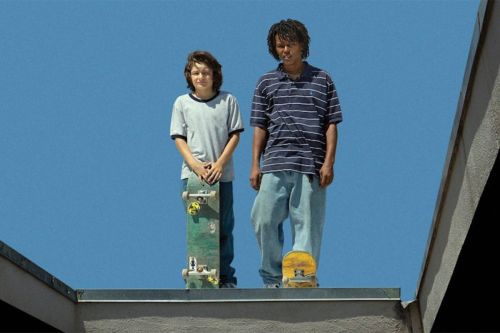Cinema | November 7th, 2018

Jonah Hill’s feature directorial debut, which he also wrote, is a textbook bildungsroman of the hetero-masculine variety, a finely tuned throwback to the “Mid90s” of its title smart enough to locate the universal experiences that everyone -- regardless of generation -- recognizes. Shot on gorgeous Super 16mm in a 4:3 aspect ratio by ace photographer and regular Kelly Reichardt collaborator Christopher Blauvelt, Hill’s lean slice of life, which runs a fleet 84 minutes, is as earnest and heartfelt as it is unapologetic about its racially-charged and homophobic milieu. Hill’s own experience as an actor pays dividends in the confident way he makes space for complete characterizations across the entire impressive ensemble.
Protagonist Stevie (Sunny Suljic), a barely pubescent 13-year-old who lives with sullen, abusive older brother Ian (Lucas Hedges) and often absent single mom Dabney (Katherine Waterston), focuses his attention on a group of mostly older skaters. Introduced to the collective by mascot Ruben (Gio Galicia), who will soon express jealousy at Stevie’s easy rapport with the others, the new kid yearns to be noticed by quiet videographer Fourth Grade (Ryder McLaughlin), easygoing joker Fuckshit (Olan Prenatt), and steady leader Ray (Na-kel Smith). Hill comments more than once on the ways in which teenagers can look years older or younger than their chronological ages, and some of the thrills of “Mid90s” are delivered via the shocking sight of angel-faced Suljic rapidly discarding his childhood.
Hill is at ease with the repartee, camaraderie, and bonhomie of bonded male groups, but in one fascinating interlude, the gang attends a mixed-gender house party. Stevie, affectionately dubbed Sunburn by the fellows, is attracted to Alexa Demie’s Estee. Nearly a head taller than Stevie, Estee takes on the lead/dominant role in the rapid seduction, remarking, “You’re, like, at the age before guys become dicks.” Later, Hill alternates, “Trainspotting”-style, between the boys comparing notes with the boys and the girls comparing notes with the girls. The gender exploration, however, pretty much ends there as the film’s raison d’etre belongs to the carefully observed patterns of gender-specific behavior enacted through the fraternal.
Alongside Hill’s careful ear for dialogue, which pinballs from vulgar braggadocio to sincere reflection (Smith nails it in one particularly wise observational exchange), the two-decade nostalgia span is at a perfect remove to get heads nodding in recognition of Jahmin Assa’s production design, Heidi Bivens’ costumes, and the soundtrack selections that drop the needle on ideal period signifiers ranging from Pixies, Nirvana, and Cypress Hill to the Pharcyde, Del the Funky Homosapien, and Jeru the Damaja.
“Mid90s” has drawn some comparisons to Harmony Korine (who makes a cameo in Hill’s film) and Larry Clark’s “Kids,” but Hill’s worldview is far less toxic and dangerous than the grimmest territory explored in the 1995 movie. Certain viewers will undoubtedly detect something approaching sweetness, especially in the film’s unlikely denouement. By contrast, Elizabeth Weitzman pegs the final scene as “either wish fulfillment or a cop-out,” but I suspect many will have carved out enough room to see is as something else altogether. Hill, who would have been Stevie’s age in 1996, can also be glimpsed in composite through the artistic aspirations of Fourth Grade, the clowning defense mechanisms of Fuckshit, and the determination and enterprise of Ray. I look forward to his next outing behind the camera.
February 16th 2026
February 16th 2026
February 9th 2026
February 4th 2026
January 26th 2026

__293px-wide.jpg)


_(1)_(1)_(1)_(1)_(1)__293px-wide.jpg)
